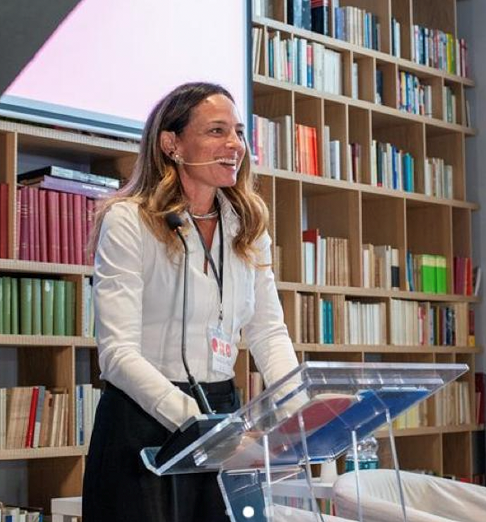
SCENARI E TENDENZE
Introduce e coordina
STEFANO PARISE, Direttore Area biblioteche del Comune di Milano
VITTORIO EMANUELE PARSI, Professore ordinario di Relazioni Internazionali, Direttore ASERI, Università Cattolica del Sacro Cuore
L’impatto della pandemia sulla modificazione dello spazio
BARBARA LISON, Presidente IFLA-International Federation of Library Associations and Institutions
IFLA supporta il settore della Global Library per costruire un futuro sostenibile
IFLA is an independent, international, non-governmental, not-for-profit organisation. Acting as the “Global Voice of Libraries” IFLA puts libraries on the global stage and supports their work by promoting high standards of provision and delivery of library and information services and by representing the interests of IFLA’s members throughout the world. Therefore, IFLA is a reference point across libraries’ activities, providing a forum for discussion and learning as well as direction and inspiration for all librarians.
With its members and active network of around 1,200 volunteers, working in its Professional Units IFLA represents the brightest minds of the library and information profession. Together with all active colleagues, IFLA works to set the professional agenda and develop standards for library services, to improve access to information and cultural heritage resources, and to advocate for the place of libraries at the heart of local and global policies. Based on well-established relations with the United Nations and other international organisations and bodies, IFLA also works as the central interface and between the global library field and supranational leaders and decision makers. By advocating for libraries, IFLA encourages widespread understanding of the value of good library and information services.
In her talk, Barbara Lison will talk about IFLA’s activities to support the global library field. She will especially focus on the IFLA Strategy, the UN Sustainable Development Goals and the IFLA Governance Reform.
Showing libraries’ contribution to development
IFLA produces a variety of materials and tools to help libraries win and maintain support for their work, helping them to show concretely the difference they can make in the lives of individuals and communities. Much of this work is structured around the framework of the United Nations Sustainable Development Goals (SDGs), which provides a comprehensive and shared roadmap not only for governments, but for all stakeholders, everywhere. Through their global application, the emphasis they give to the importance of access to information, and the opportunities for engagement, the SDGs provide a powerful structure for talking about the difference libraries can make. IFLA’s Library Map of the World is at the heart of this effort, providing data and demonstrating impact through SDG Stories and country profiles. Building on these, IFLA develops analyses and other tools which can support advocacy.
Our Development and Access to Information (DA2I) report tracks progress towards SDG commitments and provides expert insights on how information and libraries make a difference in delivering on the Goals. You find further resources explaining the contribution of libraries to development on the supporting national and regional advocacy page, including our booklet on Access and Opportunity for All, as well as the 2014 Lyon Declaration signed by over 600 organisations. In addition to these flagship initiatives, IFLA produces a wide variety of articles and papers from across library sectors, designed to show contributions across the different dimensions of sustainable development. We also strongly encourage you to use the materials prepared and shared by our Members to support your own work.
CHIARA FAGGIOLANI, Sapienza Università di Roma, ALESSANDRA FEDERICI, Ricercatrice Istat-Responsabile Indagine biblioteche
La vitalità delle biblioteche italiane: una nuova geografia post-pandemia
Le riflessioni che si presentano in questo contributo hanno l’obiettivo di contribuire alla discussione in corso sul ruolo delle biblioteche italiane, a partire dalla straordinaria disponibilità di dati che le riguardano e che rappresentano una assoluta novità rispetto al passato. Qui ci si concentra in particolare sulla loro vitalità.
Dal censimento delle biblioteche dell’Istat emerge che nell’anno 2020 sono 189 le biblioteche “definitivamente chiuse” (il 2,4% del totale delle biblioteche contattate) e 141 quelle “temporaneamente chiuse” (l’1,8%). Delle 7.459 biblioteche censite nel 2020, il 12% (901 strutture), a seguito dei provvedimenti di chiusura fisica predisposti dai DPCM per il contenimento della pandemia, hanno sospeso tutti i servizi all’utenza, anche online. Di queste la metà non sono ancora riuscite a riaprire nel 2021.
Cosa si nasconde dietro queste chiusure? Quali motivazioni? Quali elementi del contesto influiscono sulla fragilità delle biblioteche o sulla loro vitalità? Il contributo intende rispondere a queste sollecitazioni anche attraverso uno studio esplorativo capace di andare oltre i numeri per raccontare lo stato di difficoltà che le biblioteche stanno attraversando.
JOHN CHAPMAN, Senior Product Manager, Servizi Metadati, OCLC
Costruire la gestione condivisa delle entità
Over the last decade, OCLC has joined a number of national libraries and library organizations in publishing linked data. With the explosion of different efforts and initiatives, attention now turns to the ways in which the metadata can be maintained and kept vital over the long term.
In January 2020, OCLC received a 2-year grant from The Andrew W. Mellon Foundation to create a shared “entity management infrastructure” to provide libraries with a robust platform to create, maintain, use, and reuse entity descriptions for persons and creative works. In this session, we’ll discuss the reasoning behind the initiative, the progress of the effort, and what it suggests for the future of metadata work in libraries.
-

Stefano Parise
Direttore Area Biblioteche del Comune di Milano
-

Vittorio Emanuele Parsi
Professore ordinario di Relazioni Internazionali, Direttore ASERI, Università Cattolica del Sacro Cuore
-

Barbara Lison
Presidente IFLA-International Federation of Library Associations and Institutions
-

Chiara Faggiolani
Prof. Sapienza Università di Roma
-

Alessandra Federici
Prima ricercatrice, Istat
-

John Chapman
Senior Product Manager, Servizi Metadati, OCLC